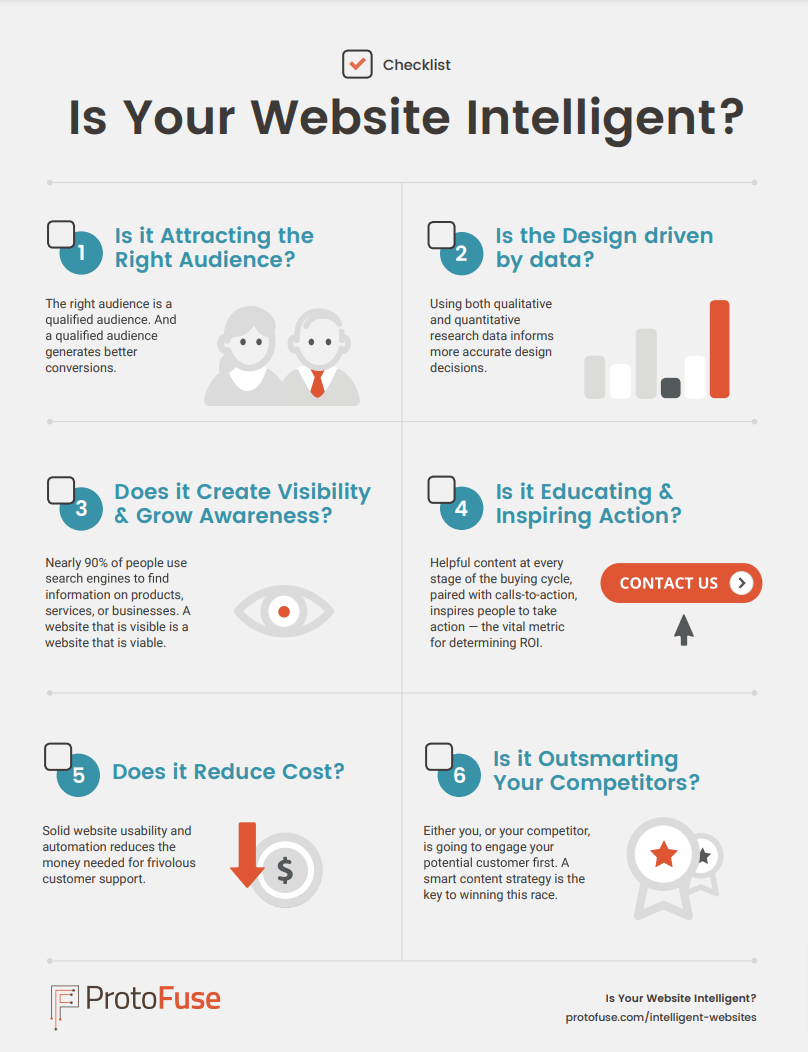What makes a website, smart?
If you own a website that's driving the right traffic and inspiring action — congratulations! These 10 elements below will most certainly resonate with you. You likely possess a smart website.
If your website is under performing, here are the 10 elements that make up a smart website.
a ProtoFuse Proverb
"We cannot solve our problems with the same thinking we used when we created them."
– Albert Einstein
1. Attracts the Right Audience
The right audience is a qualified audience. And a qualified audience generates better conversions.
In other words...
A website can attract and appeal to many different types of people. But, if a website appeals to everybody, it unfortunately appeals to nobody. Why? Because this is bad traffic that generated a bad conversion. It's not a qualified lead.
A Smart Website...
Knows exactly how to attract and convert the right people.
2. Data-Driven Design
Using both qualitative and quantitative research data informs more accurate design decisions.
In other words...
When it comes to websites, designers have two types of data to use when making decisions:
- Qualitative. Non-numerical data that shows the why and the how (e.g. user interviews, surveys)
- Quantitative. Numerical data that shows the who, what, when and where (e.g. traffic metrics, A/B testing)
HiPPOs are leaders who don’t need other’s ideas or data to affirm the correctness of their instinctual beliefs. They are quick to shoot down contradictory positions — which leads to uniformed design decisions.
A Smart Website...
Is designed using data, not opinions.
Featured Article
Research for Websites: You have 2 Types of Data to Use
There are two different types of data you can rely on when planning, designing, and marketing a website: qualitative & quantitative. Here's everything you wanted to know about website research and how to utilize both types of data to make smart website decisions.

3. Creates Visibility & Grows Awareness
Nearly 90% of people use search engines to find information on products, services, or businesses.
A website that is visible is a website that is viable.
In other words...
You could have the most beautiful and functional website in the world, but if search engines don’t know it exists, expect to hear crickets. There are 63,000 Google searches per second, and growing. Without visibility in today’s “YellowPedia”, your website is just an online brochure (and brochure websites don’t work anymore)
A Smart Website...
Is highly visible in Google and helps create awareness and trust for a company's product or service.
4. Outsmarts its Competitors
Either you, or your competitor, is going to engage your potential customer first. A smart content strategy is the key to winning this race.
In other words...
There’s a long list of tactics a business can use to outsmart a competitor. But, there’s not a more effective one today than generating regular and relevant website content. A content strategy helps a business reach its ideal prospect faster (and more effectively) than traditional outbound marketing tactics.
A Smart Website...
Is layered with valuable content and helps companies be more competitive online.
5. Reduces Costs
Help me, help you!Jerry McGuire
Are you helping your website help you? Solid website usability and automation reduces the money needed for frivolous customer support.
In other words...
For a growing business, ensuring customers are properly supported can require exponential resources. Sales go up, support expenses follow. Is that to be expected, or is there another way? The formula for reducing customer support includes:
- Great website usability. People find what they're looking for because there's few common website issues.
- Automation. Using a systematic approach, like automatic triggers when a call-to-action is completed.
A smart website...
Is easy-to-use and integrates with automated systems to decrease the need for perpetual customer support.
6. Educates & Inspires Action
A smart website presents helpful content at every stage of the buying cycle and pairs it with calls-to-action. This inspires people to take action — the vital metric for determining ROI.
In other words...
There was a time where if your website passed the eyeball test and people frequented it — you were ahead of the game. Today’s website takes much more than a great design and consistent traffic to be successful. You need more than “ooohs” and “ahhhs” to evaluate its effectiveness. You need action. More specifically, you need various types of content matched with carefully placed calls to action that follow the Four C's.
A smart website...
Is meticulous about pairing valuable content with contextual conversion elements.
7. Increases Leads for More Sales
A smart website is better than your best salesperson because it can communicate faster and more convincingly, while maintaining a unified voice.
In other words...
Salespeople are far from perfect. They can read the prospect incorrectly, present the wrong information, forget to follow up and even get sick. Or worse, they put in their two weeks (gasp!) in the middle of nurturing your biggest lead ever! A lead generation website doesn’t carry those risks. It’s on the job 24/7, never mucks up your company’s value proposition and isn’t prone to the common cold.
A smart website...
Is your virtual salesperson and will generate more leads and sales than any individual salesperson.
8. Possesses a Long-term Roadmap
A smart website owns a documented plan in how content and features will grow, be supported, and routinely be measured.
In other words...
A website without a website strategy is like a taking a hike in a foreign land without a map or compass. Where are you going? How much ground have you covered? What obstacles are approaching? A website needs a roadmap to be successful. It needs defined objectives, goals, website user personas, a content strategy and planned reviews. This documented plan — that key stakeholders contribute to — is your map and compass to navigating the Web.
A smart website...
Begins its journey with documentation and provides a birdseye view of the website’s past, present and future.
9. Retains Customer Loyalty
A smart website provides compelling reasons to revisit and further engage with content, features, and calls-to-action.
In other words...
So you’ve won a new customer, now what? Is there incentive for them to return to your website? Can they do anything if they visit?
- B2B: Your clients continually rely on your knowledge and experience. There’s not a more compelling asset than a expertise-rich website to affirm that you’re still the best fit for them.
- B2C: You should be thinking sell, sell, sell. Coupons, promotions, new products — all good reasons for existing customers to revisit the website (and to keep buying from you rather than your competitor).
A smart website...
Doesn’t stop working once the initial sale is made. It continues to think about ways to engage existing customers/clients.
10. Helps Companies Become Digitally Empowered
Smart websites prevent the Web from feeling too big, too powerful and too competitive. Knowledge is the antidote to fear.
In other words...
We realize websites can feel intimidating. There’s lingo to understand, acronyms to decode, and things are constantly evolving (Google changes their algorithm 500-600 times a year). The only thing constant on the Web is, change. But, owning a website that was intelligently built can help you become more intelligent. You start to ask the right questions. You ignore the noise and focus on the important metrics. You fully grasp the notion that web design is not decoration.
A smart website...
Helps build a company’s confidence that they can own, operate and improve a high-powered website in a sea of change.









